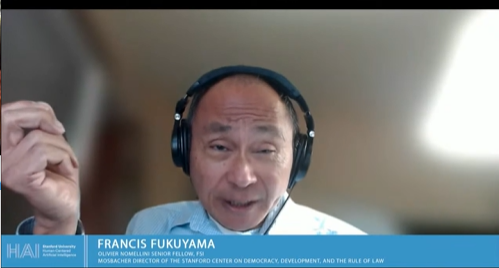Middleware could be the solution to regulating technology platform content and limiting platform power, according to Francis Fukuyama, a senior fellow at the Freeman Spogli Institute for International Studies, who spoke at Tuesday’s Policy & AI: Four Radical Proposals for a Better Society event.
The middleware panel was one of four speaker events at the Stanford 2021 Human-Centered Artificial Intelligence (HAI) Fall Conference, which featured an itinerary of faculty panels exploring policy proposals that aim to challenge the status quo on tech-centered issues and positively impact society. 2020 presidential candidate Andrew Yang was featured in Tuesday’s panel about universal basic income.
“One of the terrible things about platform power today is that people have no control over what the platforms serve,” Fukuyama said.
Fukuyama and management science and engineering professor Ashish Goel have been in collaboration since early 2020 to devise a solution — middleware — that can sit between users and technology platforms and filter content based on settings that the user can adjust.
Middleware is necessary, Fukuyama said, because it is difficult to regulate online platform content in a way that is consistent with the First Amendment. He said that the First Amendment is stricter in the U.S. than in other nations with liberal democracies. This includes the European Union, which proposed the new Digital Services Act last year, giving European governments the power to directly regulate and limit the capabilities of online platforms. European countries also enjoy a social consensus that empowers regulators to take actions on limiting platform power, according to Fukuyama.
The U.S., however, lacks that type of social consensus, he said, citing the divisive social split between liberals’ and conservatives’ attitudes toward former President Donald Trump.
Fukuyama and Goel established the Stanford Working Group on Platform Scale in early 2020, aiming to reduce the power of online platforms to amplify or silence political voices. This was when the idea of middleware first emerged as a solution. Goel said that ideally, middleware would be interconnected with major online platforms, and content on the platforms would go through the editorial judgment of the middleware. The middleware can also rank news based on a user’s preferences, according to Goel.
“No user data flows to the middleware,” he said, adding that middleware has “regulatory guardrails” that meet basic journalistic standards, such as the ability to identify missing context and check information across sources.
Another potential usage of middleware could be in academia, Fukuyama said. A coalition of universities could back a middleware company and use the software to help assess the academic credibility of sources found on online platforms. Fukuyama added that schools could also use the middleware to identify biases in the sources students use in their research.
“This substitutes private institutional power for the private individual choice,” he said.
